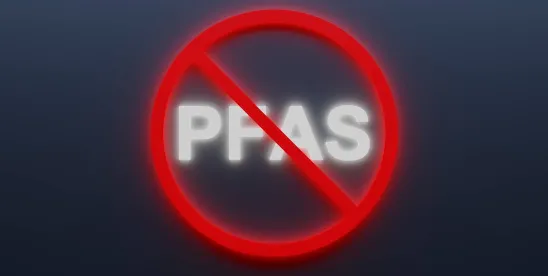With a new year has come a new wave of litigation involving PFAS (per- and poly-fluoroalkyl substances), also known as “forever chemicals.” While PFAS litigation up to this point has often involved either claims of personal injury or those concerning damage to natural resources and municipal water systems, an increasing trend of class actions is emerging implicating consumer protection laws. Recently, several large companies in the United States dealing in consumer goods have found themselves the targets of class action suits brought by plaintiffs asserting claims of consumer fraud involving PFAS.[1] The allegations asserted in these suits have a common thread in that the plaintiffs are arguing that the presence of PFAS in certain of the companies’ products was never disclosed to the consumer. The plaintiffs are, therefore, seeking to prohibit these companies from allegedly making misleading advertisements or selling these products without proper disclosures in the future.
“Forever Chemicals” Everywhere
These cases result from an increased awareness of PFAS, their wide range of uses and presence in daily life, and their alleged association with negative health and environmental effects. However, it is the widespread use of PFAS that could lead to a significant increase in consumer protection claims, as PFAS can be found in everything from clothing to furniture, pizza boxes and food wrappers, our cellphones, pots and pans, mattress pads, household dust, and even in every drop of rain.
A New Trend
Over the past couple of years, these types of lawsuits have been growing and diversifying in terms of the targeted industries. Since 2022, class action consumer lawsuits involving PFAS have been brought in courts across the country (i.e., New York, New Jersey, Illinois, California, etc.) against numerous entities in the cosmetics industry; the food, beverage and packaging industries; apparel companies; and those dealing with both regular and feminine hygiene products.[2]
Furthermore, a recent increase in legislation aimed at eliminating or at least limiting PFAS from consumer products is likely to fuel continued litigation. Over the past few years, more than 20 states, including Maine, Minnesota, and California, have enacted or are in the process of enacting consumer protection legislation addressing PFAS. At the federal level, the Toxic Substances Control Act (“TSCA”) now imposes record-keeping and reporting requirements on companies that manufacture, import, and sell products containing PFAS in the United States.
Although there has been an increase in these types of cases, many of the class actions related to PFAS consumer fraud claims have been dismissed by different courts, often either on the basis of a failure to state a claim when the specific PFAS compound at issue was not identified, or because the complaint did not establish the plaintiff’s reasonable reliance on the alleged deceptive representations.
Despite these dismissals, however, plaintiffs are not being deterred. With each dismissal, the plaintiffs’ bar is adapting and becoming more sophisticated and, thus, new lawsuits with more facts and more specific representations concerning PFAS are more likely to survive early dismissals as has been seen recently with several California cases where the courts denied motions to dismiss on the basis that consumers rely on a manufacturer’s health and wellness statements when making purchasing decisions.[3] Therefore, while early losses for plaintiffs may have originally stemmed the tide of mass PFAS consumer class actions, numerous cases are now working their way through the courts and are far more prepared for defensive challenges.
Conclusion
Considering that many states are in the process of enacting legislation responsive to PFAS, and that there is still no federal law banning the manufacture or sale of consumer products containing PFAS, the increase in related consumer class actions is all but guaranteed to continue. Therefore, those in the consumer goods industries, including their insurers and investment companies, will need to keep a close eye on this emerging trend and potentially put litigation risk mitigation plans in place in the event the trend continues to grow. These mitigation plans could include providing notice of PFAS in product labeling and any marketing strategies to ensure appropriate disclosure, finding suitable substitutes for PFAS where possible, and retaining firms like Blank Rome with significant experience in PFAS matters and defending class action suits. There is still much to be determined, but we will continue monitoring this emerging litigation trend closely.
[1] See Brown v. Cover Girl; Davenport v. L’Oreal; Azman Hussain v. Burger King; Bedson v. Biosteel; Esquibel v. Colgate-Palmolive Co.; Gemma Rivera v. Knix Wear Inc.; Anthony Ray Gonzalez v. Samsung Electronics America, Inc.; Dominique Cavalier and Kiley v. Apple Inc.
[2] See natlawreview.com/article/apples-pfas-consumer-fraud-lawsuit-latest-growing-trend
[3] See id.



 />i
/>i

